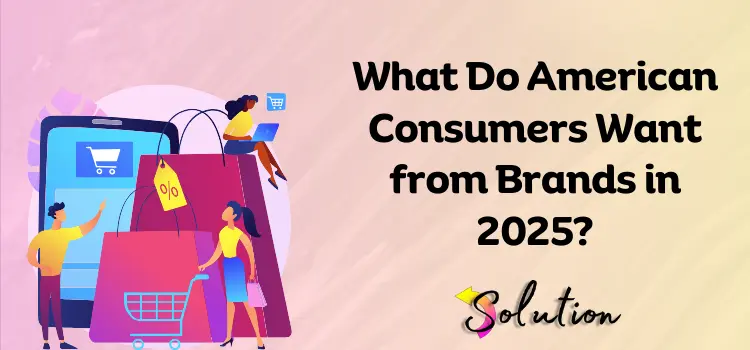
As we are standing at the end of 2024, one thing that this year has shown us is the consumer’s expectations, which are growing more rapidly than ever. The reason for this constant evolution in consumer behavior is the wide variety of alternatives available in the market. Today’s consumers have become more educated and precise in choosing the right product from the best brand. They have now started looking for better experiences rather than just a normal product.
Consumers no longer randomly add products to their carts based on price. Now, they expect brands to provide personalized recommendations, exceptional customer service, and a seamless shopping experience. Almost 95% of American consumers have shifted to e-commerce platforms, so it’s not about the products or services that brands provide—it’s about the brand’s social presence, beliefs, and values that align with the consumer’s mind.
In 2025, for a brand to thrive in the competitive market, particularly as a startup, it is crucial to understand what the consumers truly desire from them. Knowing what your targeted customers expect, you can come up with the best product, service, or experience that will truly resonate with them and may set your brand apart from the competition.
In this guide, we will walk you through some of the important points that show what an American consumer expects from a brand in 2025. Therefore, whether you are a startup or a seasoned business owner, this guide is essential and should not be overlooked.
The Mindset of an American Consumer in 2025
As a whole, American consumers in 2025 will be better educated, more ethically aware, and technologically adept than their predecessors. Experiences, values, and connections are now more valuable to them than material goods. Combining ethical concerns, seamless convenience, and individualized encounters drives their decision-making process.
The abundance of information and increased transparency enable consumers to make more informed decisions, often influenced by the social, environmental, and political stances of brands. In this dynamic market, customers look to businesses to not only satisfy but also anticipate their requirements, providing distinctive value propositions that reflect their values and complement their way of life.
1. Personalization and Customization
Customers in the United States in the year 2025 anticipate a very customized brand experience. Marketing that tries to cater to everyone in the same way isn’t working anymore. Consumers want companies to use data and technology to tailor recommendations to their preferences.
Personalization needs to be a part of every interaction, from product recommendations to channels of communication. AI-powered personalization features, such as tailored product suggestions and interactive content, can foster more meaningful connections between brands and their audiences. Brands need to provide individuals with a feeling of uniqueness if they want to remain relevant. Personalized email offers, customized shopping experiences, or customized product designs can achieve this.
2. Sustainability and Ethical Practices
The importance of sustainability has grown beyond that of a passing fad. Sustainable practices, including ethical sourcing, eco-friendly packaging, and carbon footprint reduction, will be in high demand among American consumers in 2025. Consumers trust brands that are transparent about their environmental impact and work to improve their sustainability score.
Consumers demand a premium price for products made and sourced ethically. Brands that wish to win over today’s consumers must openly discuss the ways in which they are working to solve social problems, such as waste reduction, the use of renewable energy, and the promotion of fair labor standards.
3. Strong Social Responsibility and Values Alignment
Buyers in the year 2025 are incredibly principled. Diversity, equality, and inclusion (DEI), global warming, and human rights are just a few of the social issues that consumers believe corporations should publicly address. Brand loyalty makes people more likely to buy a product.
Consumers immediately embrace brands that align with their personal values, while they respond with equal vehemence to those that don’t. Because of the potential backlash that might result from performative gestures or “woke-washing,” brands must be genuine in their action. In order to gain trust and loyalty, it is crucial to show that you are truly committed to making a beneficial difference in society.
4. Seamless Omnichannel Experience
In 2025, customers will not budge until they have a consistent, unified purchasing experience across all channels. The seamless integration of in-store, mobile app, and social media purchasing experiences is a fundamental expectation of consumers. They also expect consistent messaging, prices, and inventory across channels.
Companies will stand out if they have user-friendly websites, smart mobile applications, and cross-platform customer support that is quick to respond. Virtual try-ons and live-stream shopping made possible by augmented reality (AR) are just two examples of how emerging technologies are improving the omnichannel experience and bringing the consumer into the store like never before.
5. Speed and Convenience
Customers nowadays place a premium on ease and quickness in today’s hectic world. To succeed in 2025, a company must provide lightning-fast shipping, simple returns, and round-the-clock customer service.
Fast and dependable delivery alternatives, such as same-day or next-day shipment, have become the norm due to the popularity of e-commerce. Further, customers anticipate round-the-clock accessibility to chatbots, live agents, or social media platforms for customer care. The loyalty of today’s time-pressed consumer will go to brands that emphasize seamless experiences, starting from the moment of purchase and continuing through post-sale assistance.
6. Data Privacy and Security
Anxieties over the safety and privacy of personal information are on the rise alongside online shopping. In the year 2025, American consumers are increasingly cautious with their personal information and want brands to be open and honest about the data collection, usage, and storage practices.
A company’s image can take a serious hit if there’s a trust violation in this area. Keeping customers’ trust requires transparent privacy policies, clear permission for data acquisition, and strong security measures. Brands that prioritize data protection and openly discuss their efforts enhance credibility and reliability.
Read Also:- How Luxury Brands Are Evolving for Gen Z and Millennials
Conclusion
In 2025, American consumers are extremely picky and expect firms they support to provide them with a mix of ethical standards, technical innovation, and customized service. Customers want more than just high-quality products; they want to feel connected to brands that share their values and offer consistent, unified experiences across all channels. Brands can’t depend on cheap prices or old-fashioned marketing strategies anymore due to this change. In fact, they should focus on creating personalized, meaningful customer experiences that reflect their values and interests.
Nowadays, a brand’s identity is incomplete without a commitment to sustainability and social responsibility. Now more than ever, brands need to be open and safe about how they handle consumer data in an era when privacy concerns are on the rise. Technology, particularly AI, AR, and blockchain, will increasingly shape these customer experiences, encouraging brands to innovate constantly.
To meet the expectations of American consumers in 2025 and build lasting loyalty in an increasingly competitive marketplace, brands must integrate personalization, ethical responsibility, convenience, and cutting-edge technology into their core strategies.


